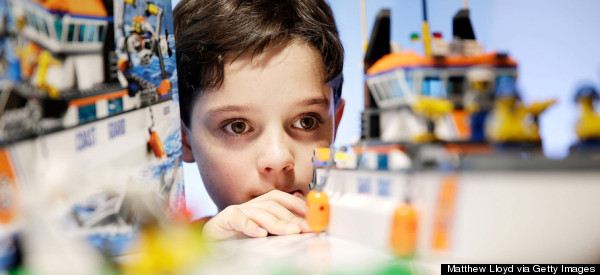
South Korea has been raising eyebrows recently as they've announced their plans to replace textbooks in their public schools with digital tablets. But what if that's not the only thing they (and schools around the World) should be replacing their textbooks with? What if more educators turned to toys to teach?
Aside from potentially making learning fun (heaven forbid), it turns out toys can teach us a lot that we should be learning, but our antiquated systems of education are failing miserably to provide. Fortunately, the folks at a frisky, new startup, 21 Toys are creating sets of toys to supply educators and learners the tools necessary to not just become smarter, but better prepared for living and thriving in the 21st century.
What If the "Three Rs" Are Wrong?
Working out of the Centre for Social Innovation and a part of Toronto's emerging social entrepreneurship scene, 21 Toys is building their business around solving a problem that affects all of us: education. As they explain, both what we learn and how we learn needs to change from what we did in the past. Instead of believing things like reading, writing, and arithmetic are the top job skills we should teach our students, what if we shifted to educating learners skills like creativity, collaboration, and critical thinking in order to prepare them to be innovative workers and live satisfying lives?
What if, as our world has changed and progressed over the years, so have the skills we need to negotiate our way through it? And what if, our education system has failed to shift along with the rest of the World? What if, in order to fix a failed system and properly shift to where we should be, we replaced the "Three Rs" with the "Three Cs"? What if, creativity, collaboration, and critical thinking were the basic skills educators focused on developing in their learners?
What If We Used Empathy to Educate?
How does 21 Toys plan to shift the way we educate? Empathy. When considering the "Three Cs," empathy is at the core of each, binding them all together. Yet, empathy is neither learned from textbooks, nor a computer screen. But it can be learned from play. The toys that 21 Toys have designed allow learners to imagine another person's position to solve a shared problem. Does this act alone create Einsteins? No. But it does help lay a foundation upon which learners can then use as they navigate the rest of their learning experiences. Instead of viewing their education as a process of digestion and regurgitation, they now understand how learning is a complex system of interconnected parts; a system full of shared responsibility and personal accountability.
What If...? is particularly keen on what 21 Toys are doing to bring empathy into education, because empathy is also the flipside of creativity -- your imagination gets a workout when you're running around in someone else's shoes. Empathy can also be a spark for curiosity. Equally important, empathy is what makes us better communicators. We at What If...? have been talking a lot lately as how part of our goal is to "evolve TED." One of the major ways we see our What If...? events improving upon the TED model is by bringing more voices into the conversation and getting more voices heard. Turns out empathy isn't just the secret to improving education, it's also the secret to more effectively share those ideas worth spreading.
What If We Started a Toy Revolution?
In a conversation with 21 Toys founder, Ilana Ben-Ari and members of the 21 Toys team, Gonzalo Riva and Ryan Burwell, they asked the question, "Why does play have to stop after the 1st Grade?" They went on to tell me how 21 Toys is inspired by Friedrich Fröbel, creator of kindergarten and inventor of the first category of educational toys, 21 Toys is determined to bring on a "Toy Revolution."
Twenty One Toys from Twenty One Toys on Vimeo.
The most brilliant concept I learned about the toys 21 Toys design is how they pull from their inspiration of little-known, Italian designer Bruno Munari, who talked about "air made visible."
In Fröbel's industrial era, most jobs were not about high-level thinking and often related to manual production. So the mark of exceptional education used to be about the sorts of abstractions that books enable (i.e. retention, regurgitation, analysis, manipulation of known ideas). This is what "made us smarter" than the reality of our jobs. Concrete educational tools (like exams) were about converging on knowledge. But, in a knowledge economy and wired world of networks, can books and (usually passive, individualized) screen interactions meet all the needs? What if they can't?
Then what skills would Fröbel design toys for today? Fröbel would first redefine what the marks of exceptional education are now: the ability to create things that don't yet exist, adaptation, self-analysis, and problem-solving collaboratively (meaning a healthy dose of communicating across diverse perspectives). If these are the new skills required, then what should the tools to build them look like?
Educational tools need to be divergent and generative. Just like a good discussion. But we don't have discussion tools! What if only toys can boil down the tough stuff into easy to understand moments of insight? What if toys can become objects for thinking in metaphors? This means, 21 Toys' toys aren't so much the product; they make the air visible. The product is the discussion. The outcome is the learner: the learner's insights, and a tangible sense of the full spectrum of his or her skills.
What can you do to help? Check out their Kickstarter campaign and, even if you can't give, share. Spread the word. Tell others about them, encourage educators to consider their products and approach, and seek ways to use empathy in your own life to bring on deeper learning experiences, whether you consider yourself a student or not.
http://www.kickstarter.com/projects/21toys/a-toy-for-empathy-unlocking-creativity-at-all-ages/widget/video.html